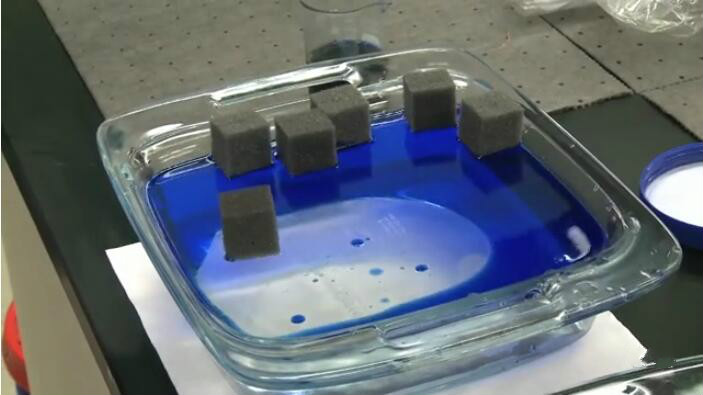(单词翻译:单击)
If you were a casual observer watching scientist Seth Darling work,
如果你曾经只是不经意地看到过塞斯•达令工作,
it would be easy to miss the low-tech but groundbreaking invention
很容易就会错过他的最新发明,这项发明虽然技术含量不高,但却十分具有开创性,
he has concocted in his brightly lit laboratory at Argonne National Laboratory.
达令所在的实验室隶属阿贡国家实验室,就在这个灯火通明的地方,他构思出了自己的新发明。
In this non-descriptive setting lies the future of sponges.
在这个难以描述的环境中,孕育着海绵的未来
"Yes, I mean it looks real simple when you demonstrate it, right?
“我是说,这个东西演示的时候看起来相当简单,对吧?
You just stick it down there and it works, but behind that is a lot of work."
你只需要把它放下去,然后它自己就会工作了。但是看似简单,我们之前也是下了很大功夫的。”
While these dark-colored pieces of foam do not look like cutting-edge technology,
虽然这些深色的泡棉乍一看确实不像是尖端技术,
Darling explains that what we can see with the human eye is not the major breakthrough.
但达令解释说,我们用肉眼所看到的其实并不是最重大的突破。

It is what is in and on the foam matters.
真正重要的是泡棉里外的东西。
After we do our treatment to it, and we create this Oleo Sponge, you put it on there and it's got a voracious appetite for oil.
“在对泡棉进行处理之后,我们发明了这款‘吸油海绵’,把海绵放到油水混合物中,它立马化身石油大胃王。
It just soaks that oil right up."
很快就把石油吸收干净了。”
Darling explains the treatment they gives the foam that "voracious appetite" is the real breakthrough,
达令解释称,他们对泡棉进行处理,给它赋予的“大胃王”特性才是真正的突破,
and underlying technology Darling and his associates developed called:
达令和同事们将这种基础技术称为:
"Sequential Infiltration Synthesis, or SIS."
“连续渗透合成物,简称SIS。”
SIS works at the nano level.
SIS的工作属于纳米级水平。
When metal oxide atoms "with complicated nanostructures" are infused throughout the fibers of the foam,
研究人员将拥有复杂纳米结构的金属氧化物原子植入泡棉纤维,
it gives it the extremely effective quality of allowing the foam to bind with the oil in the water, separating the two liquids.
这时泡棉就具有了十分有效的质量,再通过与水中的石油结合,最终将两种液体分离。
The breakthrough could dramatically change the way oil spills are cleaned up, particularly oil beneath water surface.
这项突破可能会大大改变人们清理漏油的方式,尤其是水面以下的石油。
Once it all goes down below the surface of the water and you have clouds of droplets under the surface,
“一旦石油全都跑到水面以下,就会形成一片像云彩一样的油滴。
I'm not aware of any technology today that can actually clean those up, and Oleo Sponge can."
我不知道今天有哪种技术能真正把它们清理干净。但是‘吸油海绵’就有这个能力。”
The Oleo Sponge does not just clean up the oil—it saves it, too.
“吸油海绵”不仅可以清理石油——还可以储存石油。
Oil spilled into the water is usually burned off or rendered unusable after cleanup efforts,
对于泄漏到水中的石油,人们一般的处理方法就是烧掉,或者会开展清理工作,
but the Oleo Sponge can collect and deposit the oil for further use.
但之后就无法作他用,“吸油海绵”则不同,它不仅可以吸收石油,还能将其储存下来供日后使用。
The sponge itself can also be re-used and recycled, qualities that have brought a flood of interest.
而这种海绵本身也可以重复使用,这些特质引起了人们极大的兴趣。
It's a wide variety of companies that are interested in it.
“很多公司都对我们的海绵特别感兴趣。
We've got inquiries from about 100-plus companies in the last few days."
过去几天我们接到了大约100多家公司的咨询。”
While oil spill cleanup in bodies of water is the most clearly identifiable use for the Oleo Sponge,
在水体当中进行油污清理工作是“吸油海绵”最清晰可辨的用途,
the SIS technology behind it could offer breakthroughs in a variety of other ways.
但其实SIS技术还可以在其他方面做出更多的突破。
This application is just the tip of the iceberg.
“这方面的应用仅仅是冰山一角而已。”
An iceberg Seth Darling and other scientists at Argonne are still delving into.
而这座冰山,塞斯•达令和阿贡其他科学家们依然会继续潜心研究。
Kane Farabaugh, VOA news, Chicago, Illinois.
VOA新闻,凯恩•菲拉宝于伊利诺斯芝加哥为您播报。


